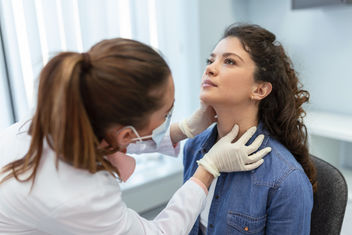Choosing the Best Medication for Thyroid Disorders: A Comprehensive Guide
April 7, 2023Thyroid disorders can be categorized into two main categories, hypothyroidism and hyperthyroidism. Treatment depends on your individual situation and doctor's recommendations.

The Inside Rx Blog
Get the Inside Scoop on tips & tricks that may help your family save on prescriptions!
Subscribe to stay up to date with the latest news and tips
Thyroid disorders can significantly impact the lives of those affected. For example, an underactive thyroid leads to fatigue, weight gain and depression. On the other hand, an overactive thyroid can cause anxiety, irregular heartbeat, weight loss and difficulty sleeping. Patients may also experience changes in their appearance, such as thinning hair, dry skin and brittle nails.
It’s best to seek medical care if you begin noticing these symptoms. This will allow you to receive the ideal treatment plan to manage the condition. Fortunately, various affordable medications are available to treat thyroid problems.
Before doctors decide the best medication for thyroid disorders, patients need to go through a couple of tests to confirm a diagnosis which may include blood tests to measure hormone levels and iodine uptake tests to identify the cause of the condition.
Choosing the Best Medication for Thyroid Disorders
Thyroid diseases can be treated with a variety of medications. Drugs used to treat thyroid disorders are categorized based on the condition they manage. Below we look into the commonly prescribed medications for the most widespread thyroid disorders: hypothyroidism and hyperthyroidism.
Thyroid Hormone Replacement (Hypothyroidism)
Thyroid hormone replacement helps to restore normal hormone levels for hypothyroidism to reduce the effects of its symptoms. This thyroid disorder medication is typically taken as a pill or a liquid as prescribed by the physician. By restoring hormone levels to normal, thyroid hormone replacement medicines can help people feel better and lead a more active lifestyle.
The following are the most commonly prescribed hormone replacement drugs:
| Generic Name | Examples of Brand Names | |:---------------------------------: |:-----------------------------------------------------------------------------------------: | | Levothyroxine | Synthroid®, Levothroid®, Levoxyl®, Unithroid® | | Liotrix | Thyrolar® | | Liothyronine | Cytomel® | | Natural thyroid | Armour Thyroid®, Nature-throid®, Westhroid® |
All medications above supplement a missing hormone, so taking the proper dosage is essential for effectively managing the disease. Patients need to see their doctor for regular checkups and check their thyroid and TSH levels to ensure they receive the correct dosage.
Thyroid hormone replacement drugs only need to be taken once daily since they stay in the body for a long time. Doctors recommend taking them on an empty stomach because food delays hormone absorption. In addition, patients should also inform their healthcare provider if they are taking other medications since certain drugs, like oral contraceptives and antidepressants, can interact with thyroid hormone replacement medicines.
Most drugs that fall in this category have rare side effects. However, possible reactions include the following:
- Sweating
- Chest pain
- Headaches
- Diarrhea
Anti-thyroid Medications (Hyperthyroidism)
Anti-thyroid medications are the primary treatment for managing the symptoms of hyperthyroidism. These drugs block the production of thyroid hormones, helping bring the levels back to normal. They are often taken orally or, in some cases, injected directly into the thyroid gland. By taking anti-thyroid medications, patients can reduce their symptoms and regain control of their health.
| Generic Name | Examples of Brand Names | |:---------------------------------: |:-----------------------------------------------------------------------------------------: | | Propylthiouracil | PTU® | | Methimazole | Tapazole® |
If taken as directed, these medicines can help manage hyperthyroidism quickly, but the issue is that the condition often recurs once they're stopped. For this reason, many are encouraged to look into more lasting treatments, like radioactive iodine treatment or surgery. Side effects of anti-thyroid medications include drowsiness, upset stomach, skin rashes and a lingering bitter taste in the mouth. In rare cases, anti-thyroid may lead to liver damage, making it essential for patients to have regular checkups with their doctor to ensure they get the correct dosage and reduce potential complications.
Some doctors may also prescribe beta-blockers in addition to anti-thyroid medications. These medicines will not alter your thyroid hormone levels, but they can help alleviate symptoms associated with hyperthyroidism. Healthcare providers may suggest taking them to help with symptoms until thyroid hormones are normal. Unfortunately, these medicines are generally not recommended for people with asthma. Side effects may include feelings of tiredness and issues related to sexual functioning.
The best medication for thyroid disorders that fall into the beta-blocker category is propranolol which is sold under the brand names Hemangeol®, Inderal® and InnoPran XL®.

Why Drug Prices Change and How Discount Cards Help

How to Handle a Drug Price Increase (After Your Plan Resets)

Preparing for 2026: Prescription Savings Trends & Planning Tips

Tips for Staying Healthy During Holiday Travel
Thyroid Disorders Medication Costs
The prices for thyroid prescriptions depend on what type of medication you get and the dosage. Your location also dramatically affects how much you spend on your medications since prices often differ from one drugstore to the next. You can check which pharmacies in your area offer your required prescriptions that suit your budget. Search for your medications on the Inside Rx website or app to compare prices easily.
Armour Thyroid
$ 32.98Levothyroxine Sodium
$ 7.70Get Potential Discounts on the Best Medication for Thyroid Disorders
Thyroid medications, whether in generic and brand-name forms, can help regulate the body's hormone levels and minimize the effects of thyroid disorders. Since it’s considered a chronic condition, costs can quickly pile up.
Patients can get potential discounts with an Inside Rx prescription discount card. Cardholders can receive up to 80 percent off their brand or generic medications the next time they fill their prescription. We partnered with nearly 60,000 pharmacies in the United States and Puerto Rico so more people can enjoy healthy savings. Download an Inside Rx discount card now to see if you can save!
Sources: